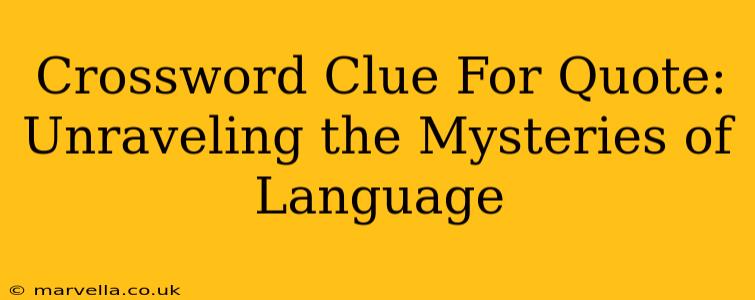Crossword Clue For Quote: Unraveling the Mysteries of Language
This article delves into the fascinating world of crossword clues, specifically focusing on clues related to quotes. We'll explore how to craft effective clues, focusing on the example "Unraveling the Mysteries of Language." We'll also address some common questions surrounding cryptic crossword construction.
What makes a good crossword clue?
A great crossword clue is concise, clever, and leads the solver to the answer in a satisfying way. It should be fair, not misleading, and ideally, offer a touch of elegance. There's a balance to strike between being too easy and being impossibly cryptic.
Crafting Clues for Quotes:
When dealing with quotes, the clue needs to hint at the quote's meaning without explicitly stating it. This often requires wordplay or a thematic approach. For "Unraveling the Mysteries of Language," we could consider several approaches:
Possible Clues (varying difficulty):
- Easy: Linguistic investigation (10 letters) - Straightforward, focusing on the core theme.
- Medium: Decoding words' secrets (10 letters) – More suggestive, hinting at the process.
- Hard: Semiotics' pursuit? (10 letters) – Uses a related field (semiotics) to add an extra layer of difficulty.
- Cryptic: Untangling tongues (10 letters) – Employing wordplay, linking "untangling" to "unraveling".
Why different approaches are needed:
The level of difficulty depends on the target audience and the overall difficulty of the crossword. A simple, straightforward clue is appropriate for a beginner-level puzzle, while a cryptic clue would challenge more experienced solvers.
Addressing common questions:
H2: What are some common types of crossword clues?
Crossword clues can be broadly categorized into several types, including:
- Straightforward clues: These directly define the answer. Example: "Capital of France (7 letters)" - PARIS
- Double Definition clues: The clue offers two definitions of the answer. Example: "A type of tree and a period of time (4 letters)" - YEAR
- Cryptic clues: These use wordplay, anagrams, or other techniques to conceal the answer.
H2: How can I improve my clue-writing skills?
- Study existing clues: Analyze clues from high-quality crosswords to understand different techniques.
- Practice, practice, practice: The more clues you write, the better you'll become at crafting effective and engaging ones.
- Get feedback: Ask others to solve your clues to see if they are clear and solvable.
H2: Are there resources available to help me learn more about crossword clue construction?
Yes! Many online resources and books are dedicated to the art of crossword construction. Searching for "crossword clue writing techniques" will uncover a wealth of information.
Conclusion:
Crafting effective crossword clues, especially for quotes, requires creativity, precision, and a good understanding of wordplay. By considering different approaches and levels of difficulty, clue writers can create engaging puzzles that challenge and delight solvers. The clue "Unraveling the Mysteries of Language" offers a rich canvas for creating various clues, from straightforward to highly cryptic. The most suitable clue will ultimately depend on the context of the crossword itself.

